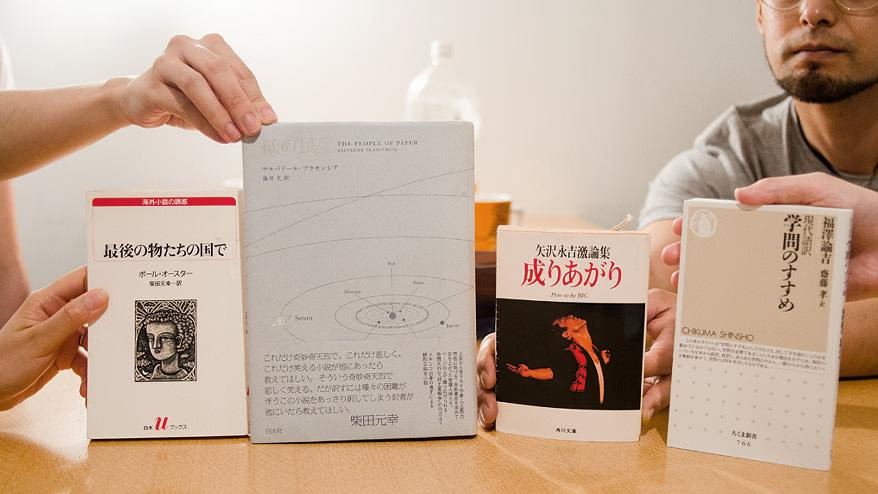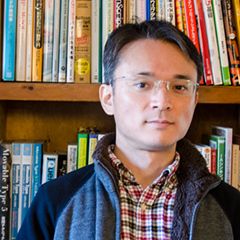もうすぐ梅雨明け。お盆や夏休みも近づいてきて、どこかへ出かける予定を立てる人も多いのではないでしょうか。
今回のテーマは「旅に持って行きたい本」。(前回の「家にこもって読みたい本」とは反対ですね。)
読み古してボロボロになった本を持って、ひとり旅に出るのもロマンがありますが、さて、今回はどんな本が集まるのでしょうか。
参加者は私(村上・図書委員長)、菊永(電話マスター&ロックミュージシャン)、和田(元・国語教師&競歩選手)、中庭(編集長)の4名。みんな前回から引き続き参加です。
発表タイム
40分間の読書タイムを終えたら、ひとり5分間でその本を紹介します。
-
やさしい口語体で読める、現代にも通じる明治の思想
福沢 諭吉(著), 斎藤 孝(翻訳)『学問のすすめ 現代語訳』(紹介者:村上 伊左夫) -
ブックデザインも仕掛けのひとつ。複数の視点の先には誰がいる?
サルバドール・プラセンシア『紙の民』(紹介者:和田 亜也) -
「怒り」を乗りこなせ
矢沢 永吉『成りあがり―矢沢永吉激論集』(紹介者:菊永 真介) -
ひとつまたひとつと物が消え、言葉が幽霊になる
ポール・オースター『最後の物たちの国で』(紹介者:中庭 佳子)
やさしい口語体で読める、現代にも通じる明治の思想
福沢 諭吉(著), 斎藤 孝(翻訳)『学問のすすめ 現代語訳』(紹介者:村上 伊左夫)
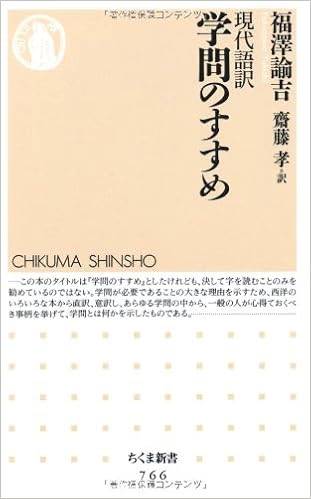
福沢 諭吉(著), 斎藤 孝(翻訳)『学問のすすめ 現代語訳』ちくま新書 2009( Amazon )
-
 村上
村上 -
小説を外で読むと周りが気になってその世界に没頭できないので、旅にはビジネス書のような実用的な本を持って行きます。
福沢諭吉の『学問のすすめ』は有名な本ですが、前半は、小学生くらいを対象に海外の思想を当時の日本に合わせてわかりやすく紹介し、後半は大人向けのビジネス書のような内容が書かれています。
現代語訳とあるように、もともと文語体のものが口語体に訳されていて、訳者は『声に出して読みたい日本語』の著者の齋藤孝。彼は大学教授でもありますが、『学問のすすめ』を読んだことがない学生があまりにも多く、それではもったいないということで、若い人にも馴染みやすい言葉に訳したそうです。
訳がいいのか、原文がいいのかわかりませんが、すごく平易な表現で、現代にも通じる内容が書かれています。
例えば、前半は「学問には目的がある」「人間の権利とは何か」など、当時の日本にとって新しい考え方を紹介していて、後半では「品格を高める」「人生設計の技術」など、今の私達が読む本でも見かける内容が登場します。
また、具体例も豊富で、「判断力を鍛える」という章には「疑ったうえで判断せよ」と書いてあります。当時(明治初期)の日本には、「日本のものはダメだ、西洋のものは素晴らしい」という西洋かぶれな価値観があって、それに対して「確かに西洋のものはすごいけれども、すべてがそうじゃない。疑ってから、取捨選択して取り入れましょう」と説いたんです。
西洋かぶれの価値観って今の時代も引きずっているし、私個人もそういう傾向があるので、すごく納得しました。他の章でも「心と働きのバランスをとれ」と言ってたり、わかりやすく例を示しながら説明してくれています。
入門としてもとても良い本だと思います。人として基本的なことを問いかけてくるので、旅という非日常のなかで、新たな気づきを得る助けにもなるのではないでしょうか。
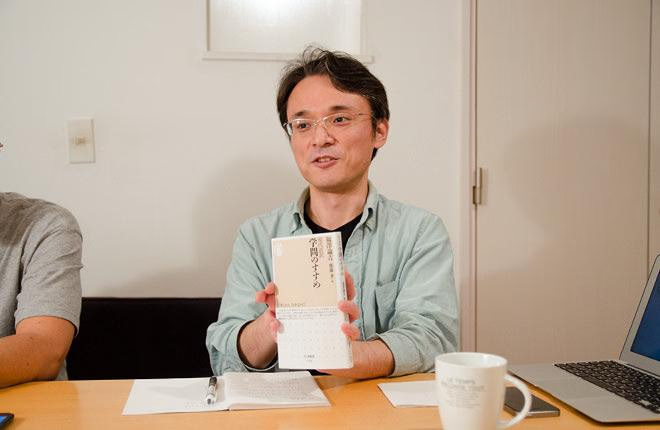
-
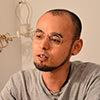 菊永
菊永 -
自分も読んだこと無かったから、ビジネス書みたいな内容っていうのは意外でした。
-
 村上
村上 -
私もそうでした。最初は低年齢層向けに書いていて、反響が大きかったから段々と大人向けに内容を足していったみたいです。
男尊女卑のような差別や、評判の良い物を無批判にありがたがる風潮だとか、現代も引きずっている問題を扱っていて、人間って100年程度では進歩しないのかなと。福沢諭吉の先見というか、洞察力がすごかったのかもしれませんが。
学問や働くことの意味について、初心に帰れるというか、改めて自問させられる本です。
-
 菊永
菊永 -
昔、『吾輩は猫である』を買ったんだけど、2、3ページ読んで「意味が分かんねぇ」と売っちゃったんですよ。文体が古いと疲れるんだよね。そういう意味でも現代語訳はすごくいい試みだと思う。
ブックデザインも仕掛けのひとつ。複数の視点の先には誰がいる?
サルバドール・プラセンシア『紙の民』(紹介者:和田 亜也)
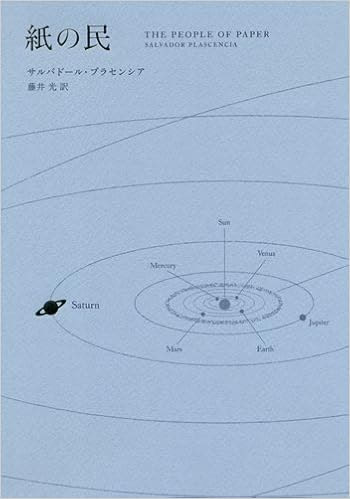
サルバドール・プラセンシア(著), 藤井 光(訳)『紙の民』白水社 2011( Amazon )
-
 和田
和田 -
宇宙の絵が描かれた表紙と、手触りのいい紙のカバーが一目で気に入って買いました。作者はサルバドール・プラセンシアというメキシコ出身の作家ですが、実は翻訳された文体が苦手で、ずっと寝かしていました。今回テーマが「旅」ということで、ちょっと離れた異国の話を読んでみたいと、思い切って本棚から引っ張り出してきました。
この本は、ひとつの出来事を様々な人の視点で描いているんですが、本文のレイアウトも面白くて、最初は普通に一段組なのが、途中から三段組、四段組、また一段組など、どんどん変わるんです。例えば三段組だと、それぞれの段で語り手が違って、三人それぞれの視点で物語が同時に進んでいくんです。
他にも、デザインが凝っている部分がたくさんあって、たとえば道で出会う赤ちゃんの視点の部分は、真っ黒に塗られることで言葉にならない言葉を表現していたり。縦書きの本文に突然横書きの文章が入ってきたり、ペンで消したような読めない箇所が出てきてたり、本好きにはたまらない仕掛けがたくさんあります。
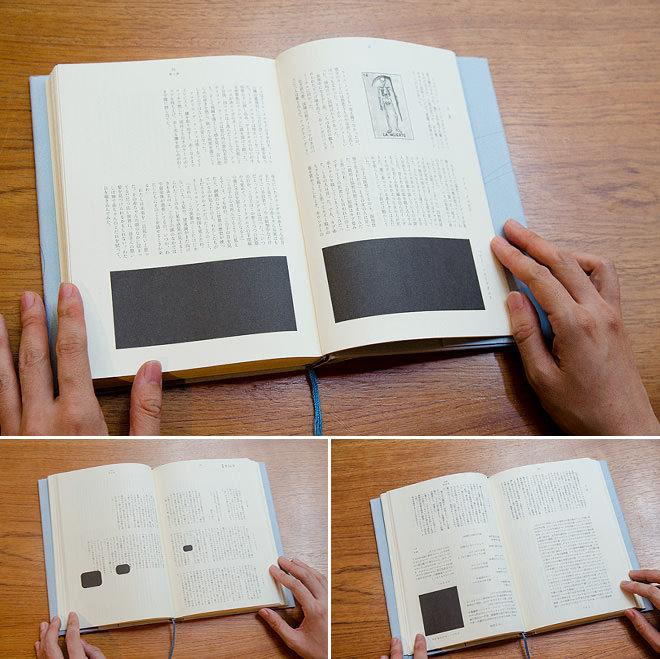
土星(作者)に考えを読み取らせない能力を持つ者が語る箇所は、黒く塗りつぶされている
-
 和田
和田 -
物語は、妻と別れた主人公のフェデリコが11歳の娘を連れてメキシコからロサンゼルス郊外の町に引っ越し、その町で起こる出来事が描かれています。
第一部で、主人公の彼は自分たちを上空から眺めている「土星」の存在に気づきますが、第二部では、この土星が作者だということが明かされます。
主人公は、土星(作者)が、話を面白くするために自分と妻を別れさせた思い込み、土星と戦争をすると言い出しますが、作者が書く本の中の登場人物たちの“現実”と、作者が実際に生活する“現実”が混ざってくるんです。脇役の一人が、土星(作者)に会いに行くシーンがあって、「俺だよ」と言っても、脇役だから「きみ誰?」と土星(作者)に覚えてもらえてなくて、すごくショック受ける描写なんかも「可哀想!」と思いながら読み進めました(笑)。
まだ途中なんですが、今後この土星(作者)と登場人物たちがどんなふうに絡んで話が進んでいくのかが楽しみです。
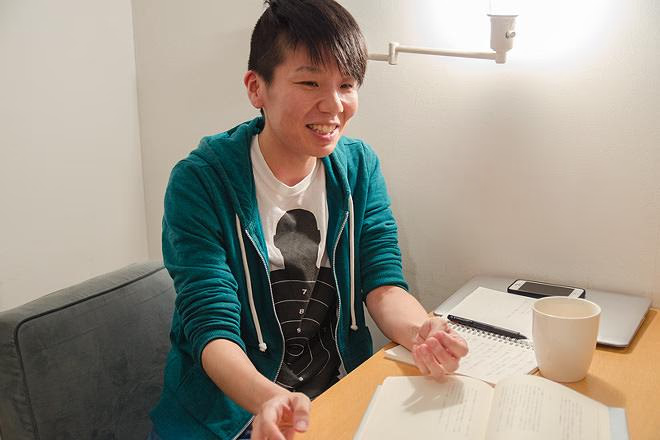
-
 中庭
中庭 -
このブックデザインを考えたのって、著者なのかな、デザイナーなのかな?
-
 和田
和田 -
わかりませんが、原作のデザインも同じみたいです。装丁は本当に凝っていて、例えばカバーの帯を取ろうとしたら本体とひっついて離れないんです。なにこれ?と思って広げると、表紙と帯が一体になっていたり。登場人物に折り紙外科医と呼ばれる、臓器や血管なんかも紙で作ってしまう医者がいるんですが、そのイメージでこの表紙も折り紙のように折られてるのかなあって。
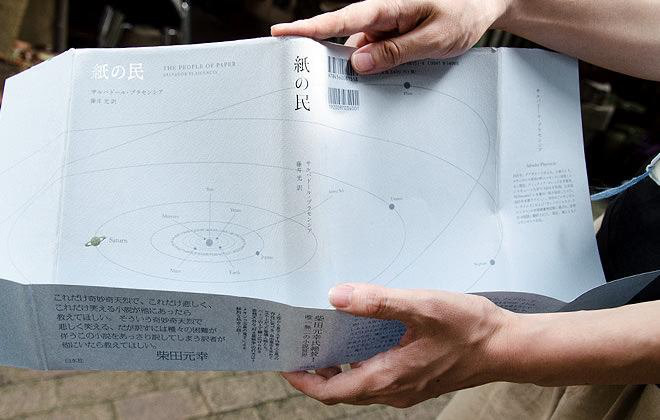
カバーと帯が一枚の紙で続いています。
-
 菊永
菊永 -
旅先にこの本を持って行ったら、旅から帰ってこれなくなりそう。
-
 和田
和田 -
そんな感じです。ラテン文学のマジックレアリズムのような、ちょっと魔法がかかった、現実かなんだかよくわからない世界に入れると思います。
「本」という存在自体としても、すごく楽しめる作品です。
「怒り」を乗りこなせ
矢沢 永吉『成りあがり―矢沢永吉激論集』(紹介者:菊永 真介)
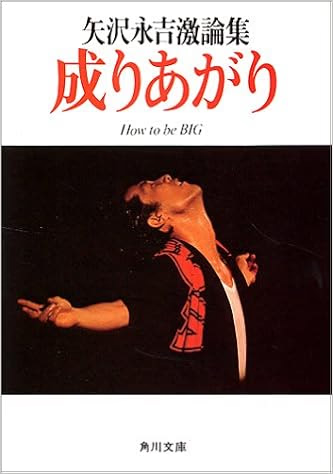
矢沢 永吉『成りあがり―矢沢永吉激論集』角川書店 1980( Amazon )
-
 菊永
菊永 -
今回は、中庭さんに貸してもらった本を持ってきました。
-
 中庭
中庭 -
以前の読書会で、「自分に情熱があるのかわからなくなる時がある」と、バンドマンとしての悩みを話していたのを思い出して、ついオススメしてしまいました(笑)。
-
 菊永
菊永 -
そうそう。この本でも「情熱は全て怒りから生まれる」みたいなことが書いてあって。
ちなみに、なぜ旅に持って行きたいかというと、実際に今、この本を持ってバンドのツアーをしてるからです。内容は、矢沢永吉の生い立ちから、スターを目指して上京したあと、アマチュア時代の苦労話、そして有名になったキャロル時代や、解散してソロで活動することになった経緯まで赤裸々に語られています。
いままでは、ちょっと独特で入りづらいなーと思ってたんですけど、これを読んだら、矢沢永吉、すっげえかっこいいなと思って。
文中で繰り返し「俺はいつも怒っている」みたいなことが書かれていて。「情熱は怒りから生まれる」というのを、別の本で読んだことがあるんだけど、この人もそう。
幼い時に母ちゃんが出ていって、父ちゃんも死んじゃって、親戚をたらい回しにされる。結局ばあちゃんに引き取られて高校を卒業するんだけど、ロックアーティストを目指して上京してから、彼のサクセスストーリーがはじまります。矢沢永吉という人は、生い立ちから苦労の連続なんですけど、怒りから生まる情熱で、それを跳ね返していくんです。
世の中の人は、怒りに飲まれるか、怒りをコントロールするか、それとも怒りを押し殺すか、3パターンくらいに分かれると思うんですが、僕自身は押し殺すというか、怒りをこう、ないものとしてしてきたんです。
だけど彼は怒りを乗りこなしてる。
それがスッゲェ格好良く見える。暴れ馬を乗りこなすみたいな。自分も怒りを乗りこなすことにチャレンジしたいなと思いました。
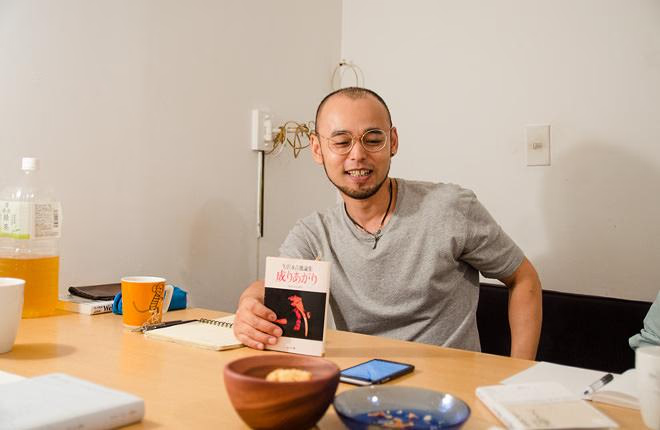
-
 中庭
中庭 -
ハングリー精神が半端ないですよね。
-
 菊永
菊永 -
印象的だったのは、子供時代、貧乏でアイスも食べれなくて、近所の金持ちの子が、これを食わしてやるよーってアイスをほっぺにつけてきたのが屈辱的だったというエピソード。本当はほっぺについたアイスをすごい食べたいんだけど、食べたら屈辱的だから、後でその子が見てない隙にペロってするという。
その時、「オレは絶対金持ちになってやる」って怒りを爆発させるんです。それが彼の原動力になっている。
-
 中庭
中庭 -
この本はザ・クレーター(菊永の所属するバンド)にも反映されているんですか?
-
 菊永
菊永 -
反映されてるよ。オレのライブパフォーマンスも少し変わったから。
-
 中庭
中庭 -
おお。今度見に行かないと。
一同 (笑)
-
 中庭
中庭 -
音楽性とかも変わったんですか?
-
 菊永
菊永 -
音楽性はまあ、そんなに急に変わらないけど、曲を作る時は、やっぱり怒りをすごい意識してる。ステージにも、ちゃんと怒りを持って上がるようにしています。
-
 中庭
中庭 -
というのは?
-
 菊永
菊永 -
ライブってみんなどう見てるかわからないけど、自分の場合は段取りがものすごくあって。曲順も、照明も、喋る内容まである程度決まっていて、表現できる幅が限られているから、感情を表に出すのが難しいわけです。工夫しないとロボットになっちゃう。
そんなことを思っていた時に、すごいタイミングでこの本を紹介してくれたなと。怒りは悪だと思ってたんだけど、プラスの表現にも変換できるんだなと気づきました。
-
 和田
和田 -
価値観が変わったんですね。
-
 菊永
菊永 -
怒りは乗りこなせばいいんだよ、というシンプルなことなんだけどね。これまでは怒りを持たないようにしてましたが、今はあえて持つようにしてます。
ひとつまたひとつと物が消え、言葉が幽霊になる
ポール・オースター『最後の物たちの国で』(紹介者:中庭 佳子)
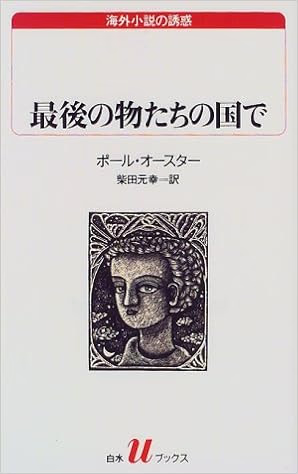
ポール・オースター(著), 柴田 元幸(翻訳)『最後の物たちの国で』白水社 1999( Amazon )
-
 中庭
中庭 -
「旅」がテーマということで、"最後の物たちの国”に迷い込んでしまった人の物語を紹介します。
この本は、主人公アンナが兄を探しに"最後の物たちの国”にやってきて、そこで起こる惨劇を友人宛につづった一通の長い手紙です。延々と続く彼女の一人語りで構成されています。"最後の物たちの国”とは「新しいものは何も生まれない」「ひとつまたひとつと物が消えていく場所」です。秩序も食べ物も家もなく、人々は混沌とし、みんな空腹に耐え、命がけで一切れのパンを探しています。
空腹のあまり人々が空想の食べ物の話をしますが、その描写がかなり事細かで。例えば、スープと前菜からはじまってデザートに至るまでのフルコースを、食べ物の香りや舌にのった瞬間の刺激のこと、喉をとおって胃に届くまでの安らぎまで語りつくすんです。しまいには食べ物の話には栄養がある、と信じる人まで現れます。そこで語られる実態のない言葉たちを、主人公は「幽霊の言葉」と言います。
また、街の半数以上の人は家がなく、不動産業者は彼らに「存在しない物件」を紹介し、手数料をせしめています。人々は幸福そうな家の写真をみるためだけに、ありったけのお金をにぎり、不動産屋の行列に並ぶんです。
家がない人々は雨が降るとやっかいで、服や靴が濡れるとそのあと何時間も何日間もツケを払わされます。天気が悪くなるのは人々の暗い気持ちが要因なので、つねに陽気な態度でいることを説く「微笑み団」という宗教団まで現れます。こんな世紀末みたいな世界なので、死がブームになっています。人々の大きな関心は「どうやって死ぬか」ということ。たとえば狂おしいほど全力で街を駆けめぐり、絶命する「走者団」という新興宗教のような団体が現れたり、いかに高いところから芸術的に「最期のひと飛び」ができるかにこだわる「飛び人」が現れたりと、「死」が人々の自己表現の手段となっていきます。
他人に委ねようとする人々も多く、安楽死クリニックが大人気となったり、暗殺クラブに頼む人がいたり……「死」の商売が繁盛しているんです。そんな世界に迷い込んでしまった彼女は、探している兄は永久に見つからず、この世界から抜け出せないことも悟りながら、希望を持たずにそれでも生き続ける。という物語です。
なんかもう極限の世界がずっと書かれているんです。いろんな物がどんどん満たされなくなって、ゼロに近づくほどどんどん研ぎ澄まれいく寓話と言うか。
主人公は、物がなくなっていく世界は言葉も「幽霊」だと言ってましたが、図書館で本を火にくべるシーンは象徴的です。言葉を捨てていく儀式のような……。
"最後の物たちの国”の住人たちは、物がないから言葉や概念にしがみついて、それで満たされようとするけど、そんな世界を断ち切るため本を燃やしているように感じました。
-
 和田
和田 -
最後も、世界はますます悪化しながら終わるんですか?
-
 中庭
中庭 -
そうですね。悪化しながらなおも続く。特に救われもせず続きます。
-
 和田
和田 -
解決もせず?
-
 中庭
中庭 -
解決もせず。最後友人に、「目的の場所に行き着いたらもう一度手紙をかくよ」みたいなことを書いて終わっているんですが、次の手紙も届かないし、多分この手紙も宛先には届いてないんじゃないかと。
-
 和田
和田 -
空想の食べ物で思い出したことがあって。高校のとき陸上で長距離をやってたんですけど、とにかく痩せろって言われて、でも食べないと走れないんです。
極限まで食べずに、でも走るために食べる。ノイローゼみたいになりながら、朝練で部員の子とずーっと食べ物の話しながら毎日50分位走ってました。極限まで食べれないからこそ、食べ物の話をして、家に帰ったら食べ物の番組を見ながらプロテインとか飲んで満足するみたいな。そういうの思い出しましたね。
一同 おお
-
 村上
村上 -
不思議な印象の本ですよね。移動してる時に読んだら旅先に不安を覚えそう。
-
 中庭
中庭 -
観光地に行こう思ってたのに、たどり着いたらこの小説みたいな国だったら面白いですよね。
-
 和田
和田 -
絶対に嫌です〜
-
 菊永
菊永 -
でも夢でそういうの見ませんか?目的地と全然違う知らない場所にたどりついて、すごい怖い思いする夢。
一同 わあああ
まとめ
「旅に持って行きたい本」をテーマに集まった4人と4冊。
旅立つ気持ちに寄り添う本、移動時間を有効活用できる本、人生を重ねるような本、行き先とはまるで違う異世界へいざなう本……。と言ったように、それぞれが持ち寄る「旅の本」はさまざまでした。
みなさんは、旅に持って行くならどんな本ですか?
